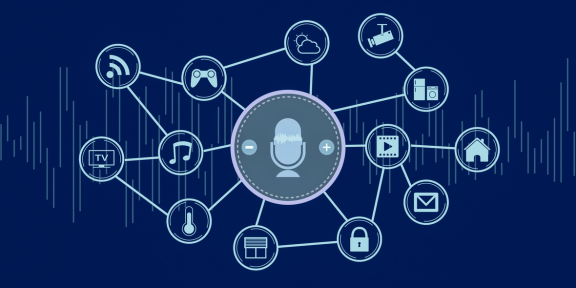AI has become an integral part of our lives, permeating various industries and revolutionizing the way things are done. One such industry that has witnessed a significant transformation is the media industry. From voice technology to video production and audio editing, AI has proven to be a game-changer. In this article, we will explore the impact of AI on the media industry, its advantages and challenges, as well as the future trends and possibilities it holds.
Artificial Intelligence refers to the development of computer systems that can perform tasks that typically require human intelligence. In the media industry, Artificial Intelligence has opened up new possibilities and transformed the way content is created, distributed, and consumed. It has brought automation and efficiency to processes that were once time-consuming and resource-intensive.

AI in Voice Technology
Voice technology has rapidly gained popularity in recent years, thanks to virtual assistants like Siri, Alexa, and Google Assistant. These voice assistants rely on AI algorithms to understand and respond to human commands. The advancements in natural language processing and machine learning have made it possible for these AI-powered voice technologies to accurately interpret and execute user requests.
AI-powered voice technology has also extended its reach to the media industry. Voice recognition software can transcribe audio files, making it easier for journalists and content creators to generate written content quickly. Additionally, Artifical Intelligence algorithms can analyze voice patterns and emotions, enabling media companies to gain valuable insights into audience engagement and sentiment.
AI in Video Production
Video production has traditionally been a labor-intensive process, requiring skilled professionals and expensive equipment. However, AI has simplified and streamlined several aspects of video production. One such area where AI has made significant strides is in video editing.
AI-powered video editing software can automatically analyze footage, identify key moments, and generate edited versions of videos. This not only saves time but also ensures a consistent and professional look across videos. AI algorithms can also enhance video quality, remove unwanted objects, and even generate realistic deepfake videos.
AI in Audio Editing
Audio editing is another area where AI has revolutionized the media industry. AI algorithms can automatically clean up audio recordings, removing background noise and improving sound quality. This is particularly useful in podcasting and radio broadcasting, where clear and crisp audio is essential.
In addition to audio enhancement, AI can also transcribe audio files, making it easier for journalists and content creators to repurpose audio content into written articles. This saves time and effort, allowing media professionals to focus on other aspects of content creation.
The Impact of AI on the Media Industry
The impact of AI on the media industry cannot be overstated. It has transformed the way content is created, distributed, and consumed. AI-powered recommendation systems have revolutionized content discovery, providing personalized recommendations based on user preferences and behavior. This has led to increased user engagement and retention.
AI has also enabled media companies to automate content distribution across various platforms and channels. By analyzing user data and behavior, AI algorithms can determine the most effective distribution strategies, maximizing reach and impact.
Furthermore, AI has empowered media organizations with valuable insights and analytics. By analyzing vast amounts of data, AI algorithms can identify trends, patterns, and audience preferences, enabling media companies to tailor their content and marketing strategies accordingly.
Advantages and Challenges of AI in the Media
The advantages of AI in the media industry are numerous. It has increased efficiency, reduced costs, and improved the overall quality of content. AI-powered technologies have enabled media professionals to focus on creative aspects rather than repetitive and time-consuming tasks.
However, there are also challenges associated with the integration of AI in the media industry. One major concern is the potential loss of jobs. As AI automates certain tasks, there is a fear that human workers may be replaced by machines. It is crucial for media organizations to strike a balance between AI automation and human creativity.
Another challenge is the ethical considerations surrounding AI-generated content. Deepfake technology, for example, has raised concerns about the spread of misinformation and the potential for misuse. Media organizations need to establish ethical guidelines and frameworks to ensure responsible use of AI in content creation and distribution.

Examples of AI in Media
There are several notable examples of AI in the media industry. Netflix, for instance, uses AI algorithms to personalize recommendations for its users, increasing user engagement and retention. The Associated Press utilizes AI-powered software to generate automated news stories, saving time and resources for journalists.
Furthermore, companies like Adobe and NVIDIA have developed AI-powered tools for video editing and visual effects, revolutionizing the post-production process. These tools enhance productivity and creativity, enabling filmmakers and content creators to bring their visions to life.
Future Trends and Possibilities of AI in Media
The future of AI in the media industry is bright, with several exciting trends and possibilities on the horizon. One such trend is the integration of AI with augmented reality (AR) and virtual reality (VR) technologies. This combination has the potential to create immersive media experiences, blurring the lines between the real and virtual worlds.
Another possibility is the development of AI-powered content creation tools. As AI algorithms become more sophisticated, we can expect to see AI-generated content that rivals human-created content in terms of quality and creativity. This opens up new avenues for storytelling and content production.
Furthermore, AI has the potential to revolutionize live broadcasting. Real-time analytics and AI algorithms can analyze audience feedback and engagement, allowing broadcasters to tailor their content on the fly. This creates a more interactive and engaging viewing experience for the audience.
Ethical Considerations of AI in Media
As AI continues to play a significant role in the media industry, it is crucial to address the ethical considerations surrounding its use. Deepfake technology, for example, raises concerns about the potential for misinformation and the manipulation of public opinion. Media organizations need to establish ethical guidelines and standards to ensure responsible use of AI in content creation and distribution.
Transparency and accountability are also crucial when it comes to AI algorithms. Media companies should be transparent about the use of AI and the algorithms that power their systems. They should also be accountable for any biases or ethical issues that may arise from AI-generated content.

Wrap Up
AI is undoubtedly revolutionizing the media industry, transforming the way content is created, distributed, and consumed. From voice technology to video production and audio editing, AI has brought automation, efficiency, and creativity to the forefront. While there are challenges and ethical considerations to address, the future of AI in the media looks promising. It is up to media organizations to harness the power of AI responsibly and ethically, ensuring a bright and innovative future for the industry.
Discover how AI can enhance your production process and stay ahead of the game
How With AI does use affiliate marketing. If you purchase certain software through our links we do receive a small commission. We appreciate this very much as we are able to reinvest the money into trying out new software for you.
